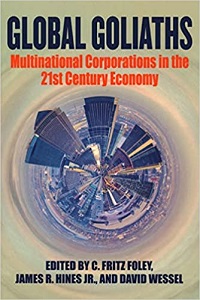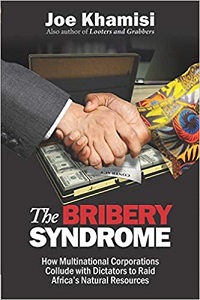How will these resources help you?
These resources critically assess the power and influence of multinationals in comparison to the nation state. In 2022, energy companies announced record profits, while paying little or no tax in the UK. This supports the view that multinational corporations are more powerful than the nation state, and points to exploitation of workers. Yet these organisations do bring growth and prosperity to many in their global search for profit, through the provision of jobs and vital infrastructure. A-level geography courses cover Global Systems, Relationships and Connections and Changing Places, all of which investigate how global governance and unequal flows of money, ideas and technology can create injustice as organisations exert their influence. At GCSE, units such as The Changing Economic World (AQA) use Unilever and Shell in Nigeria as examples to explore strategies to close the development gap (AO3).
Addressing the controversies

Global Goliaths: Multinational Corporations in the 21st Century Economy
by C. Fritz Foley, James Hines and David Wessel (edited by), published by Brookings Institution Press, (2021), 9780815738558
This book deals with the controversial reputation and often bad press that multinational corporations receive as they define modern capitalism and drive globalization to every corner of the globe. The resource offers detailed, fact-based analysis in its effort to answer questions such as: Is their multinational nature an essential driver of their profits? Do US and European multinationals contribute to home country employment? Do multinational firms exploit foreign workers? How do multinationals influence foreign policy? How will the rise of the digital economy and digital trade in services affect multinationals? Chapters of the book are suited to A-level studies, in particular the core themes Global Systems, and the Relationships and Connections element of Changing Place: Changing Places. Chapters 6 and 7 deal with jobs and exploitation of foreign workers which serve as background reading for the Global Systems content of unequal flows of people, and development causing inequalities, conflict and injustices.
Coca-Cola

Counter-Cola: A Multinational History of the Global Corporation
by Amanda Ciafone, published by Tantor Audio, (2019), B07T7KYVCV
In terms of power and global influence, few brands throughout history come close to Coca-Cola. This audio resource charts the history of this brand, which serves as an excellent case study for A-level geography students in their studies of Global Systems and Changing Place: Changing Places. The specification content requires students to investigate the characteristics and impacts of external forces on place, and in this case the decisions of multinational corporations. As part of Meaning and Representation, students are to investigate how external agencies shape the actions of individuals, and success in this is central to Cola-Cola’s global dominance. The resource takes a negative view of the institution, covering assertions of national economic interests, critiques of cultural homogenization, fights for workers’ rights, movements for environmental justice, and debates over public health.
Influencing Africa

The Bribery Syndrome: How Multinational Corporations Collude with Dictators to Raid Africa’s Natural Resources
by Joe Khamisi, published by Jodey Book Publishers, (2019), 9789966192165
This compelling book, as its title suggests, examines how global multinationals make billions of dollars in profits by bribing corrupt African dictators and public officials to secure lucrative contracts in some of the most critical economic sectors in Africa. The book focuses on 28 corrupt Sub-Saharan African leaders and their relationships with multinational corporations. The book’s chapters are suited to A-level studies, in particular the core themes Global Systems and the Relationships and Connections element of Changing Place: Changing Places. GCSE students would also benefit from some of the case studies in their own studies of the Changing Economic World, which includes a critical analysis of how (and indeed whether), the development gap can be closed, citing China’s involvement in Africa as an example.
Audiovisual clip

This World - Nestle
published by BBC, (2014)
Where does most of the UK's instant coffee come from? This clip answers this question.
Further materials
Who is more powerful – states or corporations? by Milan Babic, Eelke Heemskerk and Jan Fichtner, published by The Conversation, (2018)
Read this article
The Globalization of Starbucks: The Rise of the Largest Coffee Chain in the World by Brett Roper, published by ArcGIS Storymaps, (2021)
Access this resource
Are multinational corporations replacing states as the main actors in the international arena? by Simona Iammarino, published by netivist, (2016)
Access this resource
David Newell is Head of Geography at Millais School in Horsham, West Sussex. He has held the GA’s Secondary Geography Quality Mark since 2015, and has worked as a Specialist Leader in Education, advising schools on improving their Geography provision.
Text © David Newell, 2022.
Text © David Newell, 2022.



